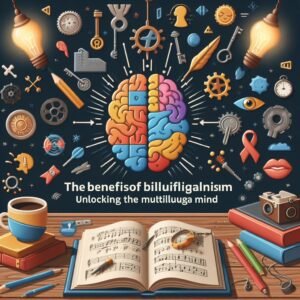Bilingualism : Your Passport to a World of Opportunity

Bilingualism, the ability to speak and understand two languages fluently, is like having a secret superpower.Bilingualism, the mastery of two languages, unlocks these doors and offers a treasure trove of advantages that extend far beyond conversation. Bilingualism is a captivating journey that offers a myriad of cognitive, social, and personal benefits. Imagine being able to effortlessly switch between languages, navigate different cultures, and connect with a broader range of people. Whether you grew up in a bilingual household or learned a second language later in life, the benefits of bilingualism extend far beyond mere communication. Let’s delve into this fascinating world where words dance across linguistic boundaries, enriching our minds and enhancing our lives. In this article, we delve into the enchanting world of bilingualism and unravel the numerous advantages it brings to those who embark on this linguistic adventure.
1. Cognitive Advantages
Think of your brain like a muscle. The more you exercise it, the stronger and more flexible it becomes. Bilingualism acts as a mental gym, giving your cognitive abilities a serious boost. Studies have shown that juggling two languages enhances executive function, the brain’s command center responsible for planning, attention, and multitasking. Imagine being able to switch between complex tasks with ease, all thanks to the mental workout bilingualism provides!
a. Mental Gymnastics
Bilingual brains are like well-trained athletes. Constantly switching between languages keeps our cognitive muscles flexed. Research shows that bilingual individuals exhibit better executive function, memory, and problem-solving skills. It’s as if their brains do a graceful tango, seamlessly transitioning from one language to another.
bilingual individuals exercise their brains daily, improving memory, multitasking abilities, and problem-solving skills. It’s as if their minds are dancing to the rhythm of two languages, creating beautiful symphonies of cognitive prowess.
b. Delayed Cognitive Decline
Bilingualism acts as a shield against cognitive decline. Studies reveal that bilinguals experience symptoms of Alzheimer’s disease later than monolinguals. Their brains remain agile, resisting the ravages of time. So, while monolingual minds may fade, bilingual ones continue to sparkle like constellations in the night sky. It’s like keeping your mind young and sharp for longer! Additionally, bilingualism can foster empathy and understanding towards people from different backgrounds. Imagine the richness that comes from being able to connect with people on a deeper level, all thanks to your language skills.
c.Enhanced Multitasking Abilities
Bilingual individuals are better equipped to handle multitasking situations, as their brains become accustomed to managing the demands of two or more languages.
2. Cultural Insights

Language is the soul of a culture. By delving into a second language, you don’t just learn new words; you gain a deeper understanding of the traditions, values, and ways of life associated with that language. It’s like stepping into a whole new world, where art, music, literature, and even humor take on new dimensions. Imagine appreciating the subtle nuances of a Japanese haiku or the rhythmic beauty of a Spanish flamenco dance – all because you unlocked the door with bilingualism.
a. Window to the World
Speaking two languages opens doors to diverse cultures. Bilinguals can savor literature, films, and music in their original forms. They appreciate nuances that monolinguals might miss—the delicate brushstrokes of a Japanese haiku, the fiery passion of a Spanish tango, or the lyrical prose of a French novel.
b. Empathy and Understanding
Bilingualism fosters empathy. When you understand different languages, you also grasp different perspectives. You see the world through multiple lenses—a kaleidoscope of ideas, traditions, and histories. Suddenly, the barriers that divide us seem flimsy, and bridges of understanding emerge.bilingual individuals enrich social interactions, fostering understanding and empathy. Through the lens of two languages, they see the world in technicolor, embracing diversity and forging meaningful connections.
3. Professional Edge
In today’s globalized world, employers are actively seeking bilingual individuals. Being able to communicate effectively in multiple languages makes you a valuable asset in a company looking to expand its reach or collaborate with international partners. So, if you’re looking to stand out from the crowd in a competitive job market, bilingualism is a golden ticket that can open doors to exciting opportunities.
a. Job Market Dominance
Employers value bilingualism. It’s like having a golden ticket to the global job market. Whether you’re negotiating business deals in Beijing or collaborating on a research project in Berlin, your language skills set you apart. Bilinguals can dance through international boardrooms, effortlessly waltzing from English to Mandarin or French to German.
b. Enhanced Creativity
Bilinguals think outside the linguistic box. Their minds blend metaphors, weave idioms, and create linguistic tapestries. They’re the poets who paint with words, the inventors who build bridges between cultures. When you speak two languages, your creativity knows no bounds.
4.Personal Benefits of Bilingualism
a.Personal Growth and Self-Discovery
Learning a new language offers opportunities for personal growth and self-discovery, as individuals challenge themselves to expand their horizons and explore new ways of thinking and expressing themselves.
b.Increased Confidence and Self-Esteem
Mastering a second language can significantly boost an individual’s confidence and self-esteem, as they gain a sense of accomplishment and pride in their newfound linguistic abilities.
c.Broader Perspective on the World
Bilingualism provides individuals with a broader perspective on the world, as they become more attuned to the nuances and complexities of different cultures and ways of life.
Frequently Asked Questions
1.Is it too late to become bilingual?
Never! Start today. Your brain is a sponge waiting to soak up new words and melodies.
2.Can I raise bilingual children?
Absolutely! Surround them with both languages, read bilingual books, and let them embrace the symphony of sounds.
3.Which languages are best to learn?
Choose languages that resonate with your heart. Whether it’s the romance of Italian or the precision of German, follow your passion.
4.Will bilingualism confuse my child?
Not at all! Bilingual kids are linguistic acrobats. Their brains adapt effortlessly.
5.What is the best way to learn a new language?
There’s no one-size-fits-all approach. Some people thrive in classroom settings, while others prefer language immersion programs or online resources. Experiment and find what works best for you!
6.How do I maintain both languages?
Practice, practice, practice! Read, converse, and immerse yourself. Your bilingual garden will flourish.
7.Will learning a new language make me smarter?
Research suggests that bilingualism enhances cognitive functions like problem-solving and memory.
8.Are there different levels of bilingualism?
Yes! Fluency can range from basic conversational skills to mastery. Celebrate every milestone on your language-learning journey.
9.What languages are most useful to learn?
The answer depends on your goals and interests. If you’re looking for global relevance, Spanish, Mandarin Chinese, or Arabic are strong choices. However, learning a language spoken in your local community can be equally rewarding.
10.How can I motivate myself to keep learning a new language?
Surround yourself with the language! Listen to music, watch movies, and find language exchange partners. The more you immerse yourself, the more motivated you’ll become.
11.Can anyone become bilingual, regardless of age?
Yes, individuals of all ages can learn a new language and reap the benefits of bilingualism.
12.How does bilingualism impact brain development?
Bilingualism positively influences brain structure and function, promoting cognitive resilience.
13.Are there specific languages that offer more benefits when learned bilingually?
Any language learned bilingually can provide cognitive, social, and personal advantages.
14.Can bilingualism help in career advancement?
Yes, being bilingual can open up a wide range of career opportunities and enhance professional growth.
15.What are some practical ways to maintain bilingualism over time?
Regular practice, immersion experiences, and engaging with native speakers can help maintain and improve bilingual skills.
16.Are there any downsides to being bilingual?
While the benefits of bilingualism far outweigh any potential drawbacks, some individuals may experience language interference or challenges in code-switching between languages. However, these obstacles are typically minor and manageable.
17.How can I start learning a second language?
There are many resources available for learning a second language, including language courses, apps, online platforms, and immersion programs. Find a method that suits your learning style and practice regularly to improve your language skills.



